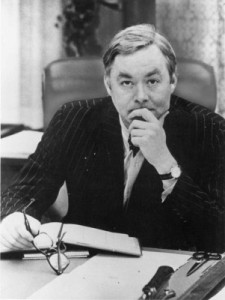
Despite its great wealth, the United States has long struggled with poverty. One popular theory for the paradox suggests that a “culture of poverty” prevents the poor from economic betterment despite social programs designed to assist them. The phrase was originally coined by Oscar Lewis, who believed that children growing up in poor families would learn to adapt to the values and norms that perpetuated poverty. The children would replicate these in their own lives, creating a cycle of intergenerational poverty. It wasn’t until Daniel Patrick Moynihan’s infamous 1965 study on the black American family (often dubbed “The Moynihan Report”) that the “culture of poverty” idea set off a firestorm. Moynihan described the problems of inner-city black families as stemming from a “tangle of pathology,” characterized by single-mother families and unemployment. His claims were harshly criticized by many black and civil rights leaders, among others, for explaining black poverty as a product of black culture rather than deeper structural inequalities. Because of this criticism, social scientists have since generally avoided discussing cultural factors when studying poverty, though the “culture of poverty” rhetoric has remained a popular topic in public and political spheres. The debate about its relevance has re-emerged with controversial comments by politician Paul Ryan, as well as numerous editorials in the Atlantic, The New York Times, and elsewhere.
In this roundtable, we asked three renowned scholars to discuss the lasting significance of the “culture of poverty” rhetoric, and what social scientists could do to contribute to (or end) this debate.
How has the culture of poverty debate evolved over the years?

Mario Luis Small: There has been some evolution, but it has probably been less in the political sphere than among social scientists. Political commentators seem to think of culture as the sum of people’s norms and values and of “the culture of poverty” as the norms and values that cause people to enter or remain in poverty. This model is much more common among commentators on the right than among those on the left, for whom this kind of explanation merely “blames the victims” for their problems. Both positions are quite old, dating at least to 1960s.
Few social scientists use the term “culture of poverty” in a scientific sense. Those who study poverty rarely think about cultural questions in this way, instead tending to focus on basic structural factors, such as the quality of schools or the availability of jobs, as explanations for poverty. Those who study culture—and these are largely a different group of scholars altogether—tend to think of culture in far more sophisticated and diverse ways than as the “norms and values” of a group. Few social scientists have attempted to understand poverty through these alternative conceptions. Many of those who do focus on questions such as the impact of poverty on culture or cultural practices, rather than the impact of culture on poverty.
Kaaryn Gustafson: Early writings on the culture of poverty, for example those by Oscar Lewis and Michael Harrington, suggested that the culture of poverty was an effect, namely an effect of economic and social exclusion. Those writings suggested that people who faced few economic opportunities in society grew hopeless. In many ways, the early discussions of the culture of poverty were a call for action, a demand that the United States, a country that prides itself in economic opportunity, take notice of the many who could not realize those opportunities.
In the mid-1960s, the culture of poverty became associated with African Americans living in concentrated pockets of poverty in urban areas. Daniel Patrick Moynihan’s report, The Negro Family: The Case for National Action (1965), noted high rates of divorce, non-marital childbearing, and welfare use among black families in urban centers and described these families as exhibiting a “tangle of pathology.” During a radio address in 1986, then-President Ronald Reagan quipped that while a War on Poverty had been famously declared in 1964, “you could say that poverty won the war.” His reason for reaching this conclusion? He noted that a lot of families were using federal anti-poverty programs, or, in his terms, were “dependent” upon federal programs–a not-so-subtle reference to the culture of poverty.
Since then, the idea that social and economic well-being ought to be measured by how few people are using government programs and not by the well-being of American families themselves has come to guide government programs. For example, the success of the federal welfare reforms passed under President Bill Clinton has been measured by the dramatic decline in the number of families receiving cash benefits. What is forgotten is that the number of American families living in poverty has risen since the welfare reforms.
Why have culture of poverty arguments been so persistent?
Small: The notion of a “culture of poverty” remains part of the conversation for a number of reasons. Some are political. For some people, the idea that people’s poverty results from their own choices and values seems to explain a lot, regardless of whether that particular idea is actually consistent with the available evidence. The term itself, “culture of poverty,” is also broad enough that it can be taken by different people to mean different things. The term is easy to reinvent from year to year.
Mark Gould: Since the Civil Rights Movement, almost everyone in the USA has come to believe that all citizens deserve equal opportunity and most have come to believe that all have equal opportunity. Most of us believe that our values are actually implemented.

If most Americans believe that African Americans should be treated as if they are the same as whites, given equal opportunities, and if most Americans believe that poor African Americans have equal opportunities, the disproportionate failure of African Americans to “succeed” can only be attributed to traits internal to them and their communities. Logically, it does not matter on what traits we focus, but often it is a “culture of poverty” that is seen as inhibiting success, as inhibiting the inability of poor blacks to take advantage of the opportunities open to them. (I limit myself here to a discussion of African Americans.)
“Culture of poverty” arguments persist given our dominant values and our dominant social science, when they are coupled with the conviction that those values are implemented effectively—that equal opportunity exists. In consequence, it is no surprise that “culture of poverty” arguments recur over and over again; nor is it a surprise that they tend to be manifest in multiple variations, focusing on one or another “cultural” attributes.
In addition, there is apparently empirical support for “culture of poverty” arguments. African Americans do less well than otherwise comparable whites on many measures of performance; poor people do less well, by definition, economically, but they also do less well educationally and are incarcerated at higher rates (whatever their actual criminal activity). Recognizing this and thinking within the dominant values in our society, many Americans think that they are “facing facts” when invoking “culture of poverty” arguments. [T]he same thing is true of many social scientists who study poverty. Social scientists are, however, less likely to believe that equal opportunity is in place, which immunizes many of them from falling into this trap.
Gustafson: The appeal of the “culture of poverty” is that it offers a clear explanation for poverty, an explanation that removes both individual agency and collective responsibility from the equation. This simplistic account of poverty—one that suggests that certain populations have developed settled social and economic sub-cultures outside the mainstream—blinds us from the historical contingencies and the political decisions that have led to a high rate of poverty relative to most wealthy nations. The current understanding of the culture of poverty suggests that poverty is intractable and dismisses that idea that policy changes can lower the rate of poverty in the United States or address the concentration of poverty in certain populations such as African Americans, Latinos, Native Americans and recent Asian immigrants; the disabled; and the parents of young children.
How has the idea of a culture of poverty affected politics and society?
Gould: The consequences of “culture of poverty” arguments have been disastrous. These arguments result in policies that seek to change blacks. If there is equal opportunity, their “culture of poverty,” in its various guises, means that African Americans are unable to take advantage of that opportunity.
Such arguments miss the nature and consequences of contemporary discrimination. While there is plenty of overt discrimination, disparate treatment, the more important form of discrimination in the USA today, is disparate impact. This is where ostensibly neutral structures and organizations, organizations that treat blacks and whites as if they were the same, generate adverse consequences for blacks.
Think about the discussions of “acting white.” If African Americans who act black are expected to perform poorly, this becomes a self-fulfilling prophecy, and (almost) only those blacks who “act white” perform well. When blacks and whites perform different cultures, act out different cultural identities, there is no reason to think that the differences are intrinsically relevant to educational performance; however, they may well affect performance when taken in conjunction with how students who perform these cultural differences are regarded and dealt with in organizations. African Americans may have a different subculture than whites, but if they perform less well than whites, it is not because of that subculture, but because of how they are processed in organizations because of it.

This discussion is, of course, too simple. It ignores the structurally-different positions blacks and whites occupy in American society, but perhaps it suggests that just because black culture correlates with “deficient performance” does not mean that black culture is deficient. We have learned to see black culture as deficient, as something we ought not to value, because of “culture of poverty” arguments, because our commonsense understanding precludes our comprehending that the problem is not intrinsic to the culture, but to the way bearers of that culture are constrained organizationally.
Gustafson: The pathologizing of the poor, the popular belief that poverty is a result of individuals’ failings to exercise personal responsibility, and the belief that government programs are by nature wasteful and breed dependency remain widespread and influential today. This perpetuates the illusion that those people—the poor people who lack a real work ethic—are poor for a reason, but that others, particularly hardworking members of the middle class, are invulnerable to economic risk so long as they are working hard enough. The persistence of the culture of poverty theory also distracts the public and lawmakers from celebrating the policy decisions that have been successful in ameliorating poverty. As a result, popular and governmental commitments to fighting poverty are slight.
Does talk about the US as a post-racial society influence the rhetoric around the culture of poverty?
Gould: Before the Civil Rights Movement, when discrimination against African-Americans was overt, liberal-minded people could explain differential performance between blacks and whites as due to overt discrimination.
In post-Civil Rights Movement America, which some erroneously see as a post-racial society, the logic of this argument changes fundamentally. In the absence of overt discrimination… liberals either have to think social structurally about the nature of discrimination, or they fall into “culture of poverty” arguments. Likewise, social scientists, even when claiming to eschew “culture of poverty” arguments, fall into them.
There is a paradox here. Participants in the Civil Rights Movement fought for the inclusion of African Americans, and derivatively others (within the American Creed), for their inclusion as full citizens. The success of the Movement, the inclusion of African Americans, including the poor, within the egalitarian values dominant in American society, and given the reality of African Americans performing less well than whites in many areas, has resulted in the construction of a New Racism. This New Racism does not result primarily in invidious biological distinctions between African Americans and whites as explanations for the “facts,” but instead in the characterization of African Americans as performing less well than whites (including in their concentrated poverty) because of their “cultural attributes.”
What is missing from the current public discourse about the culture of poverty? What can sociologists contribute to the discussion of poverty policies?
Gustafson: Social scientists concerned about social inequality should turn their attention to poverty, especially child poverty. Scholars can play a role in informing students and the public of the very fact that child poverty is widespread, can take opportunities to study the long-term effects of child poverty on families and society, and can use their skills to study the effectiveness of particular policies in reducing child poverty. More work needs to be done in tracing and examining the successes of government led-anti-poverty efforts, from the drop in poverty among elderly Americans to the documented, long-term effects of Head Start programs.
We tend to focus on failures and ignore successes. Sociologists keen on historical and comparative work might promote awareness that the United States is an outlier and that policies common in other countries—universal health care, paid family leave for workers with young children, and universal child allowances—are effective in reducing poverty there.
Finally, qualitative sociologists can serve an important function in carefully and critically documenting the experiences of the poor, particularly because there is little in the popular media about the experiences of the poor and poor people have little political access in a country where money is speech. While most Americans are overexposed to the lifestyles of the rich and famous, we rarely hear about how poverty affects daily lives and how it limits choices and life chances.
Small: I think three things are missing:
First, a broader understanding of the many ways that anthropologists and others who study culture (but not poverty) have conceptualized culture, its impact on behavior, its response to intervention, and its limitations as an explanatory factor.
Second, better data.
Third, more dispassionate analysis.
The one advantage of the new generation of scholars working on these questions is that they were not part of the highly acrimonious debate over culture during the 1960s and 1970s. The debate was so contentious and the rhetoric so heated that it has been difficult to address even basic empirical questions from a scientific perspective. [Now] there is space for a new round of clear, disinterested research that can illuminate much more than the old models have found.
For example, a lot of people assume that social scientists who examine the relationship between culture and poverty must have a particular political agenda. Some even believe that studying culture necessarily implies a particular political posture. Yet notice that entire academic disciplines—most notably, anthropology—are fundamentally devoted to the study of culture. The fact that anyone believes that studying culture means rehashing that old idea shows how far we need to go.
Gould: There are a number of conceptual distinctions we need to make before we can formulate effective policies. So far, I have been using the term “culture” as if we knew what it meant. In reality, “culture of poverty” arguments are a hodgepodge that confuse much more than they illuminate.
Implicit in many “culture of poverty” discussions is a notion of social values. Social values regulate what is desirable; they constitute obligations. If folks do not find a good job desirable, if they do not feel the obligation to work, they will not seek out jobs when the opportunity to do so arises. If students do not value education, do not feel an obligation to do well in school, they will not orient themselves to educational opportunities. In contrast to these contentions, there is a lot of evidence that inner-city blacks share the dominant values of USA society, including the positive evaluation of hard work and a commitment to education. If this is correct, we would expect them, for example, to seek work when it is available, and they do so.
The notion of an “oppositional culture” is important here. Often, an oppositional culture is understood to inhibit intrinsically educational or occupational success; it may be seen, for example, as devaluing educational success. It is treated as a “culture of poverty.” If, instead, black culture inhibits success not because of its inherent traits (it is not the case that poor blacks devalue educational success), but because of the way a black man wearing baggy jeans is treated, the question becomes why many African-Americans, unlike some immigrant groups, are unwilling to give up their culture and their cultural performances, unwilling to “act white.” The answer, I think, is because for African-Americans, this cultural identity and the performances that actualize it (in dress, music, language, speech act and style) are crucial; they represent, if in a form more fractured than previously, the collective solidarity that has enabled African-Americans to endure and to excel culturally. This is an oppositional culture, but only in the sense that African-Americans do not want to sacrifice it. As an oppositional culture, it is fully compatible with the values dominant in United States society.
Thus, while the black subculture is not a “culture of poverty”—it does not inhibit success due to its inherent attributes—it may inhibit success, due to how people who share it are considered in the larger society. This distinction, between a “culture” that inhibits success because of qualities inherent to it (e.g., for example, not valuing hard work), and a culture that inhibits success, not because of its inherent qualities, but because of the (racist) orientation of a dominant (and sometimes others in the subordinate) group towards people within that culture, is crucial, but too often missing from discussions of culture and poverty.
If this analysis makes sense, our concern should be to construct opportunities for the inner-city poor to succeed, ladders of achievement that facilitate their success in school, that make it possible for them to find jobs that will support their families in dignity, and to reconstruct organizations in a way that makes it possible for African-Americans to share in organizational governance so that African-American cultural identities might be actualized to the benefit of all Americans.

Comments 6
Should the U.S. provide reparations for slavery and Jim Crow? | Complete World News — May 6, 2016
[…] African-Americans fall at the bottom of America’s racial and social hierarchy. That reality has routinely and popularly been explained as a result of their inferiority. Initially the claim was rooted in genetics. Today it is based primarily on a theory of cultural deficiency. […]
#Should the U.S. provide reparations for slavery and Jim Crow? | THE PRESS — May 7, 2016
[…] African-Americans fall at the bottom of America’s racial and social hierarchy. That reality has routinely and popularly been explained as a result of their inferiority. Initially the claim was rooted in genetics. Today it is based primarily on a theory of cultural deficiency. […]
Should the US provide reparations for slavery and Jim Crow? — May 10, 2016
[…] African-Americans fall at the bottom of America’s racial and social hierarchy. That reality has routinely and popularly been explained as a result of their inferiority. Initially the claim was rooted in genetics. Today it is based primarily on a theory of cultural deficiency. […]
Should the US provide reparations for slavery and Jim Crow? — May 10, 2016
[…] African-Americans fall at the bottom of America’s racial and social hierarchy. That reality has routinely and popularly been explained as a result of their inferiority. Initially the claim was rooted in genetics. Today it is based primarily on a theory of cultural deficiency. […]
Should the U.S. Provide Reparations for Slavery and Jim Crow? - — May 27, 2016
[…] African-Americans fall at the bottom of America’s racial and social hierarchy. That reality has routinely and popularly been explained as a result of their inferiority. Initially the claim was rooted in genetics. Today it is based primarily on a theory of cultural deficiency. […]
Siddhartha — October 31, 2016
Sir, Perhaps you do agree that we are least concerned or ashamed of our deep rooted corruption, degraded Environment, dirty Politics, poor public work place, non-stop consumption of Social Space. Most of us (of all communities - Tamil/Bengali) in this Indian sub-continent are infected by ‘Culture of Poverty’ (Oscar Lewis), irrespective of religion/sex, dwells in pavement or apartment. Hopelessness syndrome is one of the prime factors causing our harsh, indecent living. The common practice of ours - parenting only by self-procreation (animal instinct/cheap consumerism), deliberately deprive to all our children the basic rights of a dignified living. Force the entire generation survive within a society where quality Space is almost nil. All of us do nurture Poverty right inside our own home. If freedom is desired sincerely from the very vicious cycle of poverty has to change lifestyle - restrict ourselves from procreation to any child by any means (discontinue the corruption legacy) till the society improves, co-parenting (adopt) children those are born in extreme poverty, instead. Something needs to begin somewhere to ignite a movement ‘Production of Space’ (Henri Lefebvre) to establish hope/love, a participation to take control over the present situation. Decent & efficient Politics would certainly come up. +91 9051147375.